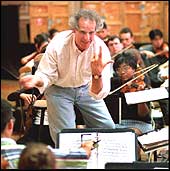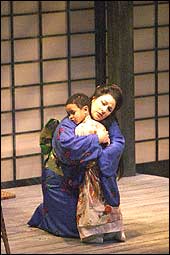|
|

|
|
 Conductor Benjamin Zander of the Boston Philharmonic.
Conductor Benjamin Zander of the Boston Philharmonic.
Best Classical Music of '99
By Richard Dyer
1. Oratorio: Handel's "Hercules" at Emmanuel Music, conducted by Craig Smith, with Lorrain Hunt Lieberson; Britten: Spring Symphony, Andre Previn, BSO, Tanglewood Festival Chorus
2. Concerto: Krystian Zimerman: Chopin Piano Concertos with Polish Festival Orchestra (tour performance in Amherst); Gianluca Cascioli in Mozart's C-Major Piano Concerto, K 467, with Roberto Abbado and BSO; Isa Haendel: Dvorak Violin Concerto with Sir Andrew Davies and BSO
3. Orchestral Performance: Claudio Abbado: Mahler's Seventh Symphony with Gustav Mahler Youth Orchestra (Tanglewood); Bruckner's Ninth Symphony with Berlin Philharmonic; Benjamin Zander: Mahler's Eighth Symphony with Boston Philharmonic; Susan Davenny Wyner and Dominique Labelle in Shostakovich's 14th Symphony with New England String Ensemble; Braham's First Symphony with Bernard Haitnik and BSO
4. Early Music Event: Anne-Sophie von Otter with Reinhard Goebel and Musica Antiqua Koeln
5. New or Recent Works: John Harbison: "The Great Gatsby" (Metropolitan Opera); Judith Weir, "Natural History" with Dawn Upshaw, Sir Simon Rattle and BSO; "The Consolations of Philosophy" with Janice Felty, Richard Pittman and the Boston Musica Viva (Tanglewood); George Benjamin, "First Light" with Dawn Upshaw and the BSO (Tanglewood)
6. Opera: "Madame Butterfly," Seiji Ozawa and BSO; Puccini: "Il Trittico," Richard Conrad and Boston Academy of Music
7. Gala Event: Andrei Sakharov Tribute with Mstislav Rostropovich
8. Piano Recital: Russell Sherman, All-Chopin (Harvard-Epworth Church); Sergey Schepkin: Bach's "Well-Tempered Clavier"
9. Vocal Recital: Ben Heppner
10. Cabaret/Crossover Event: Tovah Feldshuh: Tovah out of Her Mind!
Musician of the Year: John Harbison
|
 his was an extraordinary year for music making, as every year seems to be in this highly musical city. Just picking out a few events - and cheating by listing more than one performance in several categories - can hardly do justice to the bounty and quality of the season's offerings. And, needless to say, it has long been impossible for any single person to hear everything of importance, because events of interest have a maddening way of taking place at the same time.
his was an extraordinary year for music making, as every year seems to be in this highly musical city. Just picking out a few events - and cheating by listing more than one performance in several categories - can hardly do justice to the bounty and quality of the season's offerings. And, needless to say, it has long been impossible for any single person to hear everything of importance, because events of interest have a maddening way of taking place at the same time.
The biggest news of the year was the announcement that Seiji Ozawa would leave the Boston Symphony Orchestra's music directorship to take a comparable position with the Vienna State Opera. The worst news of the year, WCRB-FM's decision to drop the Metropolitan Opera's Saturday afternoon broadcasts, was almost immediately followed by the good news that WHRB-FM, WBOQ-FM, and other stations immediately rushed to supply the programs to many if not all of the listeners affected by the cancellation.
Ozawa had a good season, on the whole, and delighted audiences with what amounted to a fully staged performance of Puccini's ''Madama Butterfly'' - an opera he had wanted to conduct all his life (he was ill at one performance, and intrepid BSO assistant conductor Federico Cortese took over). Another Ozawa highlight was Mahler's ''Resurrection'' Symphony.
It was an outstanding year for Mahler altogether, when you consider also Claudio Abbado's performance of the Seventh Symphony with the Gustav Mahler Youth Orchestra and Benjamin Zander's triumphant completion of his Mahler cycle with the Boston Philharmonic in a wildly applauded performance of the Eighth Symphony in Symphony Hall.
Beyond ''Butterfly,'' operatic events of special quality included the Boston Symphony's delightful performance of Oliver Knussen's ''Where the Wild Things Are,'' under the direction of the composer; the Boston Academy of Music's Puccini ''Trittico''; the Boston Early Music Festival's Cavalli ''Ercole amante''; and several student performances, including ''Albert Herring'' at Boston University, ''A Midsummer Night's Dream'' at the New England Conservatory, and Cavalli's ''Giasone'' at the Harvard Early Music Society.
Singers who excelled this year were the entire cast of Emmanuel Music's ''Hercules'' (Lorraine Hunt Lieberson, Jayne West, William Hite, Jeffrey Gall, and James Maddalena), and, in various other contexts, Anne Azema, Sharon Baker, Janet Brown, Janice Felty, Robin Ginenthal, Robert Honeysucker, Frank Kelley, Dominique Labelle, Laurie Monahan, Sanford Sylvan, and Mary Westbrook-Geha, among the locals, and Brent Ellis, Jose van Dam, Ben Heppner (especially in his parlor ballads and Russian songs), Anne Sofie von Otter and Dawn Upshaw, among the celebrity visitors. In his Boston debut, Helmut Lotti worked harder than any singer this listener has ever seen. The Belgian crossover star may not be a classical singer, but no other top Elvis impersonator could begin to sing ''Nessun dorma.'' Lieberson's singing of Dejanira's mad scene from Handel's ''Hercules'' stood on a unique dramatic and vocal pinnacle.
The 19-year-old Gianluca Cascioli proved to be a pianist of unusual musical distinction in his BSO debut. Krystian Zimerman painstakingly rehearsed an orchestra of young Polish musicians for more than a month in the accompaniments to Chopin's piano concertos, which are not supposed to be interesting; prepared with this degree of freedom and polish, they sounded ravishing. Other pianists who played up storms included Jonathan Biss, Gabriel Chodos, Yefim Bronfman, Andreas Haefliger, Constantin Lifschitz (Monadnock Music), Marilyn Nonken (a superb new-music specialist), and Russell Sherman (who joined his wife, Wha-Kyung Byun, and some of their pupils for a memorable evening of piano-ensemble music during ''July in Jordan''), and Dubravka Tomsic (Liszt's E-flat Concerto with the New Hampshire Symphony and a superb recital during the Newport Festival); Sergey Schepkin played and recorded both books of Bach's ''Well-Tempered Clavier.''
 Paula Delligatti and a young child in the BSO's "Madama Butterfly." (Photo / Michael Lutch)
Paula Delligatti and a young child in the BSO's "Madama Butterfly." (Photo / Michael Lutch) |
Among the most-admired conductors of the year, local and international, were James DePreist, Hans Graf, Bernard Haitink (an outstanding Brahms First with the BSO), David Hoose (making Handel's ''Messiah'' sound fresh again), Leon Kirchner, Andrew Parrott, Andre Previn, Gunther Schuller, Stanislaw Skrowaczewski, Craig Smith, Robert Spano, Jeffrey Tate, the indefatigable Julian Wachner, and Susan Davenny Wyner.
Instrumentalists who won praise included, among violinists, Bayla Keyes (irrepressible in just about everything); local 14-year-old prodigy Stefan Jakiw; Irina Muresanu (in recital with pianist David Deveau); and Rolf Schulte (an Elliott Carter premiere). In concerto (Dvorak) and in encore (Handel/Hubay and Tchaikovsky), Ida Haendel demonstrated how a ''living legend'' doesn't have to sound embalmed. Violist Nikuthula Ngwenyama played, and encored, Hindemith's ''Trauermusik'' at the Gardner Museum under the direction of Kirchner.
Other events and personalities that captivated the Globe's music writers included pianist Virginia Eskin's Faure with the Art of Music Chamber Players, Robert Kapilow (BankBoston Celebrity Series' pied piper to children and adults); the Mendelssohn String Quartet in Harvard's Schoenberg symposium; early-music cellist Phoebe Carrai; Broadway, television, and film veteran Tovah Feldshuh's fantastic one-woman show at the Leventhal-Sidman Center; and composers George Benjamin, Eric Chasalow, Rebecca Clarke, Lee Hyla, Thea Musgrave, and Yehudi Wyner.
It is important to salute the work of the long-established new-music ensembles (Alea III, Boston Musica Viva, Collage, Dinosaur Annex, ExtensionWorks) and to welcome some of the relative newcomers (Auros, Boston Modern Orchestra Project, Longitude, Phantom Arts). All of them, operating with limited resources, are engaged in the most essential musical task of all. (One should also applaud nonspecialized ensembles, such as the Pro Arte Chamber Orchestra and Metamorphosen, that regularly include new music as part of their normal programming.)
This season the prestige of the Metropolitan Opera brings the music of John Harbison to his largest audience to date; the first national broadcast of the new century on Saturday goes to ''The Great Gatsby.'' But the musician-of-the-year award goes to Harbison not because of his opera, entertaining and touching as it is. Instead it rightfully belongs to a composer and performer who has continuously enriched local musical life since arriving here as a Harvard freshman in 1956 and who stands as a model of musical citizenship. The Boston musical community has served Harbison well, and he in turn has rewarded the city and its performers with a great and varied literature that records a life in our time, and here.
Globe correspondents Richard Buell, Susan Larson, Michael Manning, and Ellen Pfeifer contributed to this report.


